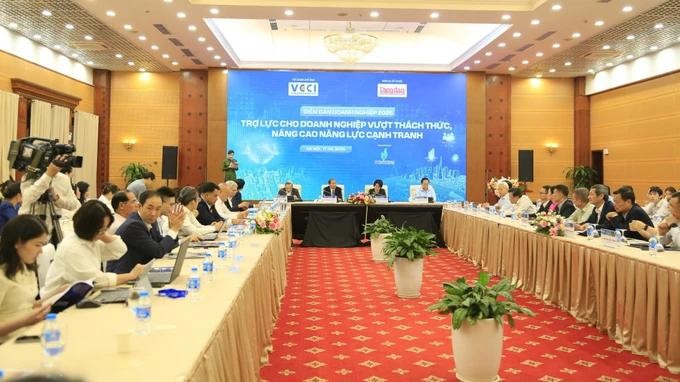Experts advocate for enhanced FTA utilization to expand export markets
Experts advise enhancing the capacity to effectively use free trade agreements for the expansion of export markets.
Yesterday afternoon in Hanoi, the Vietnam Chamber of Commerce and Industry (VCCI), in collaboration with Business Forum Magazine, hosted the 2025 Business Forum. The event, themed "Supporting businesses to overcome challenges, improving competitiveness," aimed to propose solutions for the sustainable development of the business community in the evolving landscape.

Speaking at the forum, VCCI Vice President Hoang Quang Phong stated that the reciprocal tax policy announced by U.S. President Donald Trump on April 2—along with global responses—has had, is having, and will continue to have a significant impact on the global economy, trade, investment, and financial markets. He noted that countries with large trade surpluses with the U.S., including Vietnam, are particularly affected.
To achieve a breakthrough in 2025, he believed reforming economic institutions, improving the business environment, and promoting and supporting enterprises will be key. Developing and enhancing the competitiveness of Vietnamese enterprises, particularly the private sector, to master core technology and integrate deeper into the global value chain is an essential requirement in the coming period.
Following the U.S.'s announcement of a 46 percent tariff on imports from Vietnam, a government official stated that free trade agreements (FTAs) present an opportunity for Vietnam to deepen its global integration.
By 2025, Vietnam is expected to have signed and be negotiating up to 20 FTAs, with 16 FTAs already in effect. These include new-generation trade deals like the Comprehensive and Progressive Agreement for Trans-Pacific Partnership and the Regional Comprehensive Economic Partnership.
The above agreements have opened up a large market with more than 60 countries and territories, accounting for about 90 percent of the global gross domestic product (GDP). The rate of FTA tariff incentives taken advantage of by Vietnamese enterprises will reach about 37 percent in 2024.
Thereby, FTAs not only help diversify the market, reduce dependence on some traditional markets, but also create conditions to attract high-quality FDI capital from major partners such as Korea, Japan and Singapore; creating opportunities for Vietnamese enterprises to participate more deeply in the global supply chain.
However, the potential of free trade agreements remains underutilized, as many businesses—particularly small and medium-sized enterprises—lack adequate information and understanding of rules of origin and preferential tariff procedures. Meanwhile, rising non-tariff barriers, including technical standards, environmental regulations, and labor requirements, present significant challenges for Vietnamese goods to comply.
Addressing current challenges, Office Chief Trinh Minh Anh of the Interdisciplinary Steering Committee for International Economic Integration emphasized the necessity for Vietnamese enterprises to enhance their awareness and understanding of FTAs. He further recommended optimizing the application of rules of origin to fully leverage tariff preferences and bolstering competitiveness through improvements in product quality.
Additionally, he advised businesses to actively engage with industry associations to gain crucial market insights, address operational challenges including transportation costs and technical barriers, resolve international disputes, proactively respond to trade defense lawsuits, and maintain close coordination with State management agencies to access information support on FTAs and effectively address implementation issues.
Meanwhile, Director of the Institute for Policy and Strategy Studies Tran Thi Hong Minh commented that it is necessary to promote business linkages to form production chains and supply chains with preferential policies on taxes, access to capital, credit guarantees, and business premises according to the level of participation in linkages.
Additionally, she emphasized that fostering the establishment and growth of substantial Vietnamese private enterprises, which can connect, consolidate, and guide domestic small and medium-sized businesses across various industries, could enhance the country's significant role in the global supply and value chains.








